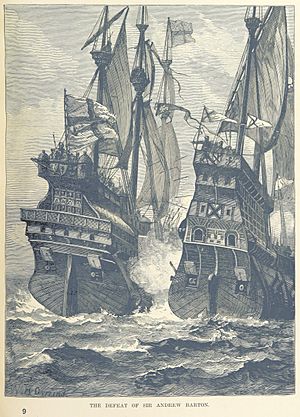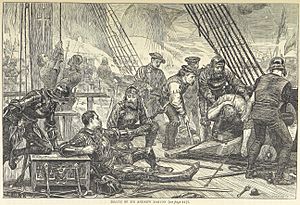Andrew Barton (privateer) facts for kids
Sir Andrew Barton (born around 1466 – died August 2, 1511) was a famous Scottish sailor from Leith. He became well-known as a privateer, which meant he was allowed by his government to attack enemy ships. He often raided Portuguese ships. Andrew Barton was killed in a sea battle and is remembered in old English and Scottish folk songs.
Andrew Barton's Adventures at Sea
Some of Andrew Barton's early trading trips to ports in Flanders (a region in modern-day Belgium and the Netherlands) in the 1490s are written down in old records. He was the oldest of three brothers. His younger brother, Robert Barton of Over Barnton, later became a very important financial officer for Scotland's king.
Andrew became famous, or perhaps infamous, in England and Portugal. People sometimes called him a 'pirate'. However, he was actually a privateer. This means he operated under a special permission called a "letter of marque" from the Scottish king. This letter allowed him to attack ships from countries that were considered enemies of Scotland.
The first letter of marque against Portuguese ships was given to Andrew's father, John Barton, by James III of Scotland before 1485. John's ships had been attacked by Portuguese vessels when he was trading in Flanders.
King James IV renewed these special permissions in July 1507. In 1508, Barton was sailing in his ship, the Lion, and tried to get revenge on Portuguese ships. But he was stopped by Dutch officials in Veere. King James IV had to write to important leaders, including Emperor Maximilian, to get Andrew released in 1509.
After this, Andrew captured a Portuguese ship that was carrying English goods. This caused more problems, and King James IV had to temporarily stop Andrew's special permission for a year. In 1509, Andrew also captured a ship from Antwerp called the Fasterinsevin. This ship was not covered by his special permission. King James IV ordered him to pay back the captain and his crew for the ship's cargo.
The Barton family was also asked to help John, King of Denmark. King John allowed them to bother ships from Lübeck, a German city. In return, King John sent King James IV wood for his ships' masts. Andrew briefly joined King John's service in the spring of 1511. But he sailed away without permission, even taking a ship that King James IV had given to King John.
Andrew Barton's Last Battle
Later in 1511, Andrew Barton was sailing near the English coast. He was still looking for Portuguese ships to capture. However, he and his ships, the Lion and Jenny Pirwyn, were attacked. They fought a fierce battle with Sir Edward Howard and his brother Thomas Howard, 3rd Duke of Norfolk. The battle happened off the coast of Kent at the Downs.
According to old folk songs, Andrew was shot and killed by an English archer during the fight. His head was then cut off and taken to the English king as proof of his death.
This battle was mentioned two years later during the battle of Flodden. The story of the sea battle was also written down by historians like Raphael Holinshed in the 1500s. Holinshed's story says the Howards first pretended to be friendly. Then they suddenly attacked. He wrote that Barton's ship was the Unicorn and that Barton died from his injuries. The Scottish sailors who survived were taken to London and held prisoner.
Another historian, Edward Hall, wrote that Andrew encouraged his men during the fight by blowing a whistle. Hall also mentioned that Andrew's two ships were brought to Blackwall on August 2, 1511. The prisoners were later set free after they admitted they had been acting like pirates.
The Scottish bishop John Lesley also wrote a similar account of the battle. George Buchanan added a detail that Andrew Barton kept fighting even after his leg was broken by a gunshot. He encouraged his sailors by beating a drum before he died from his wounds. Buchanan also said that the Howards sailed to chase the Scottish ships because King Henry VIII ordered them to, after a Portuguese ambassador complained. Hall wrote that King Henry VIII was in Leicester when he gave the order to the Howards.
Images for kids
 | James Van Der Zee |
 | Alma Thomas |
 | Ellis Wilson |
 | Margaret Taylor-Burroughs |





